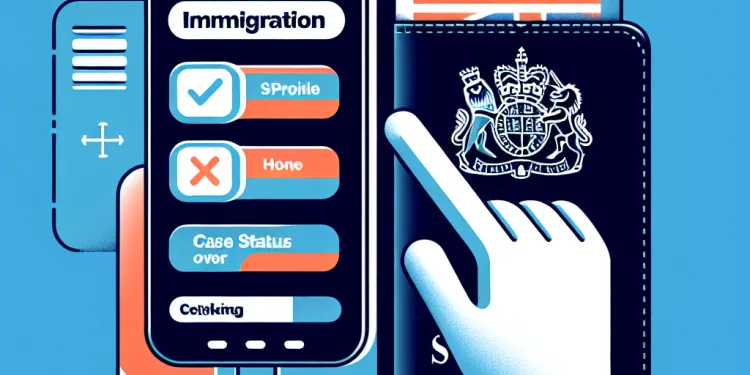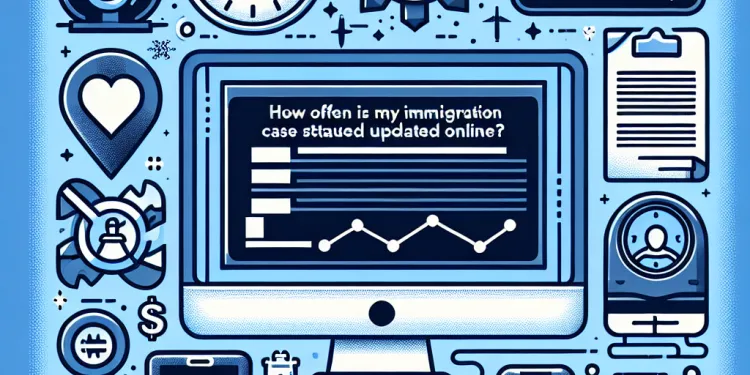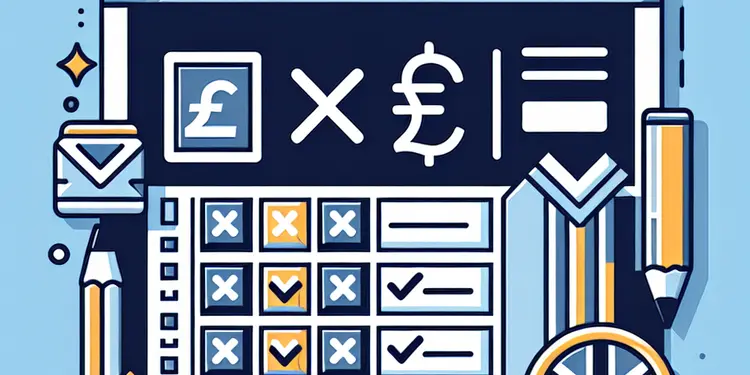
Find Help
More Items From Ergsy search
-

What is the USCIS Case Status Online tool?
Relevance: 100%
-

Can I check the status of my immigration case by phone?
Relevance: 98%
-

How often is my immigration case status updated online?
Relevance: 96%
-

Why does my online case status show 'case received' for a long time?
Relevance: 95%
-

What should I do if my case status has not changed in a long time?
Relevance: 91%
-

How can I get information on my immigrations status?
Relevance: 69%
-

How can I check my immigration status online?
Relevance: 65%
-

What happens after my immigration case is approved?
Relevance: 62%
-

Can I get updates on my immigration status via email?
Relevance: 62%
-

What information do I need to check my immigration status online?
Relevance: 60%
-

Where can I check the status of my application?
Relevance: 60%
-

Is documentation of student status required for the payment?
Relevance: 60%
-

Employment Tribunal Cases Surge Amidst Gig Economy Debate
Relevance: 59%
-

Can SEND status change over time?
Relevance: 58%
-

My friend has received their status update, and I haven't. Should I be worried?
Relevance: 58%
-

How can I check my penalty points status?
Relevance: 58%
-

How can I check the status of my online tax return?
Relevance: 56%
-

Can I visit a USCIS office to inquire about my immigration status?
Relevance: 55%
-

How long does it take to process an immigration case?
Relevance: 52%
-

Can my attorney check my immigration status for me?
Relevance: 47%
-

Are measles cases rising in the UK?
Relevance: 47%
-

How can I contact USCIS if I have specific questions regarding my case?
Relevance: 47%
-

What is the legal status of ketamine in Canada?
Relevance: 47%
-

Are measles cases currently rising in the UK?
Relevance: 45%
-

Is there a fee to bring a case to the tribunal?
Relevance: 45%
-

What is causing the rise in measles cases in the UK?
Relevance: 45%
-

Do I need a solicitor to bring a case to the tribunal?
Relevance: 43%
-

Is there a standard minimum or maximum time for a case to reach court?
Relevance: 43%
-

What happens if I lose my case at the tribunal?
Relevance: 42%
-

Does the location of the court affect case timing?
Relevance: 42%
-

Is dialysis used in methanol poisoning cases?
Relevance: 41%
-

What documents are required to bring a case to the tribunal?
Relevance: 41%
-

Does the Attorney General in the UK handle prosecution cases?
Relevance: 40%
-

Bringing Land Registration Cases to the First-Tier Tribunal
Relevance: 40%
-

How does the type of case impact the court schedule?
Relevance: 40%
-

How do I know if my case is eligible for the First-Tier Tribunal?
Relevance: 40%
-

Magistrates in the Family Court: A Private Law Case
Relevance: 40%
-

How long does it take for a case to come to court?
Relevance: 40%
-

What is a typical timeline for a civil case to come to court?
Relevance: 40%
-

How quickly can a criminal case come to court?
Relevance: 40%
Understanding Your Case Status
In the UK, when dealing with various organisations or government departments, it's common to track the status of your case online. Whether it's a visa application, benefits claim, or a legal matter, keeping tabs on your case status is crucial. However, there are times when your case status appears stagnant, not showing any updates for an extended period. This can be frustrating and worrying, but there are steps you can take to address this situation.
Verify Your Details
Before taking any action, ensure that the information you are using to check your case status is correct. Double-check the reference numbers, passwords, or security questions required to log into the online portal. Verify that you are visiting the correct website and that you are using the right credentials. Inaccurate details could lead you to believe your case has not progressed when it might actually have.
Contact the Responsible Department
If your case status hasn't changed for a significant amount of time, it's a good idea to contact the relevant department or organisation responsible for handling your case. Gather all necessary information, such as reference numbers and personal details, before reaching out. You can usually find contact information on the official website of the department you're dealing with. Calling or emailing can provide you with direct information and clarity on any possible delays.
Understand Standard Processing Times
It's important to consider standard processing times for the particular case you are dealing with. Some cases, like visa applications, have typical processing timelines, which can vary depending on the specifics of the case and current backlogs. Research these timeframes to understand whether the delay you're experiencing is within the normal range or if it warrants further action.
Use Official Channels for Updates
Stay informed by using official resources to get updates about your case. Many departments offer online portals where you can track your case status. Additionally, official social media channels sometimes provide information on general delays or updates to processing times. Make sure to follow credible and official sources to avoid misinformation.
Seek Assistance from Your Member of Parliament
If you have pursued all usual avenues without success, you might consider reaching out to your local Member of Parliament (MP) for assistance. MPs can sometimes provide help in expediting or investigating the progress of your case, particularly when significant delays occur. Write a detailed letter or email outlining your situation, including any correspondence you've had with the department in question.
Consider Legal Advice
If the delay in your case is significantly affecting your rights or livelihood, and you've exhausted all other options, seeking legal advice might be a necessary step. Legal professionals can offer guidance on how to proceed and may be able to assist in effectively pursuing your case.
Knowing Your Case Status
In the UK, you can often check your case status online. This is for things like visa applications, benefit claims, or legal issues. It's important to know what's happening with your case. Sometimes, your case status doesn't change for a long time. This can be stressful, but there are things you can do to fix it.
Check Your Information
Make sure the details you use to check your case are right. Double-check your reference number, password, or security questions. Ensure you are on the correct website. Wrong details might make you think nothing is happening with your case when it is.
Contact the Right Department
If your case status hasn't changed for a while, contact the department that handles your case. Get all the important details ready, like your reference number. You can find their phone number or email on their official website. Contacting them can give you more information about your case.
Know How Long It Takes
Find out how long cases like yours usually take. For example, visa applications have typical processing times. Check if the delay is normal or if you need to worry. Knowing this can help you decide what to do next.
Use Official Sources
Get updates from official sources only. Many departments have online portals for case tracking. Some also use social media for updates. Follow these official channels to get the right information.
Reach Out to Your MP
If you've tried everything without success, contact your local Member of Parliament (MP). MPs can sometimes help with cases that have big delays. Write to them with all the details, including any past messages with the department.
Think About Legal Help
If the delay is hurting your life or rights, and you've tried everything else, consider getting legal help. A lawyer can guide you on what to do next and help with your case.
Frequently Asked Questions
What is the typical duration after which I should be concerned if my case status has not changed?
Processing times can vary greatly depending on the type of case. If your case status has not changed for a significantly longer period than the average processing time for cases like yours, it might be time to inquire further.
How can I check the processing times for my type of case?
You can check the expected processing times on the official website of the institution handling your case. They usually have tools or documents outlining current processing times for various types of cases.
Should I contact the authority handling my case if the status hasn't changed?
Yes, if the status hasn't changed beyond the normal processing time, you should contact the authority to inquire about the status of your case.
How should I contact the authority about my case status?
You can usually contact them through a customer service hotline, email, or an online inquiry form on their official website.
Is there a specific department or person I should contact about my case?
It's best to contact the customer service department or the specific division handling your type of case, as listed on their official website.
What information do I need to provide when inquiring about my case status?
Be prepared to provide your case or application number, your full name, date of birth, and any other relevant personal information they might need to locate your case.
What should I do if there is no response after contacting the authority?
If you do not receive a response, follow up with the authority periodically via different communication methods like phone, email, or a visit, if possible.
Can I check my case status online?
Many institutions provide an online portal where you can log in and check your case status using your case number and personal information.
Is it normal for case processing to take a long time?
It can be normal for some cases to take longer than expected due to workload, complexity, or resource constraints. Always refer to the typical processing times for your specific case.
What if I suspect an error or issue with my case file?
If you suspect an error, contact the authority immediately to clarify and ensure your case is being processed correctly.
Can hiring a lawyer help expedite the process?
A lawyer can provide advice and potentially help communicate with the authorities more effectively. However, they cannot directly expedite processing times.
What are the signs that my case might be stalled or forgotten?
Signs can include no updates in status despite passing the typical processing time, lack of communication from the authority, or repeated errors in your case details.
Is there an ombudsman or external body I can contact for help?
Some jurisdictions or sectors have an ombudsman or similar body you can contact if you believe your case is being mishandled.
How often should I check my case status?
You should check your case status periodically, such as once a month, especially if it has passed the expected processing time.
What can cause delays in my case status updates?
Delays can be caused by high volumes of cases, missing documentation, needed verifications, or administrative backlogs.
Can I escalate my case if the status is not updated?
Yes, many institutions have procedures to escalate cases. Check their website for specific instructions on how to request an escalation.
Will withdrawing my application and reapplying help?
Withdrawing and reapplying might restart the process and may not necessarily resolve the delay. It's best to first attempt resolving the issue with the current application.
How can I ensure my case is not overlooked in the future?
Ensure all your documents are correctly filed, regularly check status updates, and maintain open communication with the authority.
What should I avoid doing if my case status is delayed?
Avoid stalling communication; don’t bombard the authority with excessive inquiries, but instead follow their guidelines for status updates.
Is my situation unique or are delays common?
Delays are common in many bureaucratic processes. Talk to others who have gone through similar processes to gauge the typical experience.
When should I worry if my case has not changed?
If you do not see any updates for a while, you might start to worry. It is okay to wait a bit, but if nothing happens for a long time, you should ask for help.
You can ask someone you trust, or use a computer to check for updates. These things can help you understand what is happening.
The time it takes to process your case can be very different. It depends on what type of case you have. If your case has not moved for much longer than normal, you might want to ask about it.
To help understand better, you could:
- Ask someone you trust to explain it to you.
- Use a clear "case tracker" tool online to see updates.
- Set reminders to check for any changes in your case.
How do I find out how long my case will take?
Here is an easy way to find out:
- Look on the USCIS website. This is the website of the people who process your case.
- Find the "Check Case Processing Times" page on their website.
- You will see a place to pick the kind of case you have. Pick yours from the list.
- Then pick which office is handling your case.
- Click "Get Processing Time" to see how long it might take.
If you need help reading, you can use tools like:
- Online dictionary: Look up hard words.
- Text-to-speech: It reads the text out loud.
You can find out how long it might take on the website of the place dealing with your case. They have tools or papers that tell you the time it usually takes for different cases.
What should I do if my case hasn't changed?
Here is what you can do:
- Think about calling, emailing, or writing a letter to the people who are in charge of your case.
- It might be helpful to ask someone you trust to help you contact them.
- If you find it hard to talk to them, maybe use a friend or an advocate to help you.
If it is taking a long time to get an answer, you should call or write to ask for help.
How do I ask about my case?
You can call or write to ask how your case is going. Here are some tips:
- Find the right phone number or address. Check letters you got or the official website.
- Get your case number ready. It should be on letters you received.
- Use simple and clear words. Say your name and case number.
- Ask politely. Be patient if you need to wait for an answer.
- Use tools to help you, like a friend, family member, or an app that reads for you.
You can talk to them in three ways:
- Call their phone number for help.
- Send them an email.
- Fill out a form on their website.
You can use tools like a speech-to-text app to help you with writing or reading emails. Using colorful stickers can remind you what to do next when calling or filling out forms.
Who should I talk to about my case?
If you want to talk about your case, find the right person or team who can help. You can:
- Ask a helper or friend to find out for you.
- Call the place you need help from and ask who you should talk to.
- Look on the website for contact details.
It can be helpful to use big letters or colors when you write their name and number.
You should talk to the customer service team. They are the people who can help you. Look on their website to find the right team for your question.
What do I need to ask about my case?
Have your case number or application number ready. You will also need your full name, your birthday, and any other important information to help find your case.
What to do if no one replies when you contact someone in charge?
If you contact someone in charge and they do not reply, you can try these steps:
- Wait a little longer. Sometimes it takes time to reply.
- Check if you sent the message to the right person or place.
- Try contacting them again. Make sure your message is clear.
- Ask someone you trust for help. They might have more ideas.
You can use tools like reminders or notes to help you remember to follow up.
If you don't hear back, try again. You can call them, send an email, or go to see them. Do this every so often. It's okay to use different ways to talk to them.
Can I see my case status on the internet?
Yes, you can! You can look at your case status on a computer or tablet. You need to go to the right website and put in your information.
Here are some tips to help you:
- Ask a friend or family member for help if you need it.
- Use a computer or tablet with internet access.
- Have your information ready, like your case number or personal details.
- If you find reading hard, you can use tools that read the text out loud.
Lots of places have a website where you can log in to see how your case is going. You will need your case number and some other personal details.
Do cases usually take a long time to finish?
Sometimes, things can take a bit longer. This might be because there is a lot of work to do, the job is tricky, or there aren't enough people to help. It's a good idea to check how long it usually takes for things like your case.
You can use a calendar or a reminder app to keep track of time. If you have any questions, ask someone who can help explain things.
What if I think there is a mistake in my case file?
If you think something is wrong with your case file, here is what you can do:
1. **Check the file:** Look carefully at your case file to find out what might be wrong.
2. **Ask for help:** You can talk to someone who can help, like a friend, family member, or a support worker.
3. **Contact the right person:** Find out who you should talk to about fixing the mistake. This might be a case worker or someone at an office.
4. **Write it down:** It can be helpful to write down what you think is wrong or what your questions are.
Support Tools:
- **Use a Dictionary:** To understand any difficult words, you can use a simple dictionary.
- **Ask Questions:** It is okay to ask questions if you don't understand something.
- **Use a Computer or Tablet:** They can help you find answers or send messages to the right person.
If you think there is a mistake, tell the right people as soon as you can. They can help check and make sure everything is right.
Can getting a lawyer make things go faster?
A lawyer can give advice and help talk to the right people. But they cannot make things happen faster.
How can I tell if my case is stuck or forgotten?
Signs to watch for:
- Your case is stuck, and it takes much longer than usual.
- No one gets in touch with you about it.
- There are mistakes in your case details again and again.
If you're having a hard time, it's helpful to:
- Ask someone you trust to help read or explain things.
- Use tools that read text out loud.
- Take breaks and go through it slowly.
Who can I talk to for help?
If you need help, you can talk to someone called an ombudsman. They listen to problems and try to help fix them.
If you can’t find an ombudsman, look for another group outside the place you’re having trouble with. They might be able to help too.
You can ask a friend or someone you trust to help you find the right person to talk to.
In some places, there is a person called an ombudsman. You can talk to them if you think your problem is not being handled right.
How often should I check my case progress?
It is important to check how your case is doing. You can do this to know if there are any updates. A good way to remember is to check:
- Once a week
- Or when someone tells you there's an update
To help you, you can:
- Set a reminder on your phone or calendar.
- Ask a friend or family member to remind you.
Checking your case regularly helps you stay informed!
You should check your case status often, like once a month, especially if it is taking longer than expected.
Why is my case taking so long?
Sometimes things get slowed down because there are too many cases, some papers are missing, we need to check things, or there's a lot of work for the staff.
What can I do if my case is not updated?
If your case is not updated, you can ask for more help.
You might need to talk to a manager or someone in charge. This is called "escalating" your case.
Here are some things you can do:
- Ask a family member or friend to help you speak to the right person.
- Write down what you want to say before you talk to someone.
- Use a phone or computer to contact a manager.
It's okay to ask for help!
Yes, many places have steps to get more help if needed. Look at their website to find out how to ask for more help.
If I take back my application and try again, will it help?
If you take back your application and try again, it might start everything over and not fix the problem. It is better to try and fix what is wrong with your current application first.
How can I make sure people see my case in the future?
Here are a few tips:
- Write down what you need to say. Use short words and sentences.
- Tell someone you trust about your case. They can help you explain it to others.
- Use pictures or diagrams if they help you explain things better.
- Ask questions if you don’t understand something.
- Use a voice recorder to remember important details.
- Practice speaking about your case so you feel confident.
- Find out who makes decisions and speak directly to them.
These steps can help make sure people understand and remember your case.
Make sure you put all your papers in the right place. Check what's happening often, and talk to the people in charge to stay updated.
What should I not do if my case is taking a long time?
Don't ask too many questions all at once. Follow their rules to find out what's happening.
Am I the only one with this problem, or do delays happen a lot?
Delays happen a lot when dealing with official paperwork. Talk to people who have done this before to find out what to expect.
Useful Links
This website offers general information and is not a substitute for professional advice.
Always seek guidance from qualified professionals.
If you have any medical concerns or need urgent help, contact a healthcare professional or emergency services immediately.
Some of this content was generated with AI assistance. We’ve done our best to keep it accurate, helpful, and human-friendly.
- Ergsy carfully checks the information in the videos we provide here.
- Videos shown by Youtube after a video has completed, have NOT been reviewed by ERGSY.
- To view, click the arrow in centre of video.
- Most of the videos you find here will have subtitles and/or closed captions available.
- You may need to turn these on, and choose your preferred language.
- Go to the video you'd like to watch.
- If closed captions (CC) are available, settings will be visible on the bottom right of the video player.
- To turn on Captions, click settings .
- To turn off Captions, click settings again.
More Items From Ergsy search
-

What is the USCIS Case Status Online tool?
Relevance: 100%
-

Can I check the status of my immigration case by phone?
Relevance: 98%
-

How often is my immigration case status updated online?
Relevance: 96%
-

Why does my online case status show 'case received' for a long time?
Relevance: 95%
-

What should I do if my case status has not changed in a long time?
Relevance: 91%
-

How can I get information on my immigrations status?
Relevance: 69%
-

How can I check my immigration status online?
Relevance: 65%
-

What happens after my immigration case is approved?
Relevance: 62%
-

Can I get updates on my immigration status via email?
Relevance: 62%
-

What information do I need to check my immigration status online?
Relevance: 60%
-

Where can I check the status of my application?
Relevance: 60%
-

Is documentation of student status required for the payment?
Relevance: 60%
-

Employment Tribunal Cases Surge Amidst Gig Economy Debate
Relevance: 59%
-

Can SEND status change over time?
Relevance: 58%
-

My friend has received their status update, and I haven't. Should I be worried?
Relevance: 58%
-

How can I check my penalty points status?
Relevance: 58%
-

How can I check the status of my online tax return?
Relevance: 56%
-

Can I visit a USCIS office to inquire about my immigration status?
Relevance: 55%
-

How long does it take to process an immigration case?
Relevance: 52%
-

Can my attorney check my immigration status for me?
Relevance: 47%
-

Are measles cases rising in the UK?
Relevance: 47%
-

How can I contact USCIS if I have specific questions regarding my case?
Relevance: 47%
-

What is the legal status of ketamine in Canada?
Relevance: 47%
-

Are measles cases currently rising in the UK?
Relevance: 45%
-

Is there a fee to bring a case to the tribunal?
Relevance: 45%
-

What is causing the rise in measles cases in the UK?
Relevance: 45%
-

Do I need a solicitor to bring a case to the tribunal?
Relevance: 43%
-

Is there a standard minimum or maximum time for a case to reach court?
Relevance: 43%
-

What happens if I lose my case at the tribunal?
Relevance: 42%
-

Does the location of the court affect case timing?
Relevance: 42%
-

Is dialysis used in methanol poisoning cases?
Relevance: 41%
-

What documents are required to bring a case to the tribunal?
Relevance: 41%
-

Does the Attorney General in the UK handle prosecution cases?
Relevance: 40%
-

Bringing Land Registration Cases to the First-Tier Tribunal
Relevance: 40%
-

How does the type of case impact the court schedule?
Relevance: 40%
-

How do I know if my case is eligible for the First-Tier Tribunal?
Relevance: 40%
-

Magistrates in the Family Court: A Private Law Case
Relevance: 40%
-

How long does it take for a case to come to court?
Relevance: 40%
-

What is a typical timeline for a civil case to come to court?
Relevance: 40%
-

How quickly can a criminal case come to court?
Relevance: 40%


